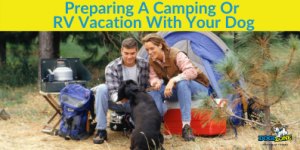Preparing A Camping Or RV Vacation With Your Dog
Most dogs love to travel in the vehicle, and they tend to enjoy camping vacations in the great outdoors as much or more than their owners. Taking your beloved pooch on a camping trip in a tent or an RV is a wonderful time to get in exercise, spend time bonding, and find time to explore new areas and have new experiences. 
Preparing in advance for your dog’s safety and well-being only takes a short amount of time, but it is necessary for your pet. These simple steps help to reduce any risk to your pet. They also ensure you have the ability to deal with issues that may come up on any trip.
Pet Identification During Camping
Check to make sure all information through your microchipping registry is up to date. This is critical as your contact information may be old or incorrect, making it very difficult to be reunited with a lost dog when camping away from the home.
Collars and ID tags are also important. Have your cell phone number, email address, and perhaps an alternate contact number in easy to read format on the collar and on the ID tags. Be sure to use the cell phone number on the phone you plan to take with you unless there is someone home to answer a house phone.
Collars with information or ID tags should be used in conjunction with microchip technology and tattoos. Many people do not take found dogs in to have them scanned or know where to look for identifying tattoos.
Securing the Dog in the Vehicle
Dogs should be transported in the vehicle in a crate or an approved dog seatbelt restraint system. This not only prevents the dog from being hurt in the event of a vehicle accident or the need to apply the brakes, but it also stops dogs from leaping out at a truck stop, gas station, or a rest area.
Always attach the leash to the collar and hold the leash securely when removing the dog from the crate or dog seatbelt. Never allow the dog to run free in these areas as there are safety concerns should the dog get out into traffic, become frightened by a noise, or even if the dog gets into the garbage, contaminated water sources, or other issues.
Outdoor Issues to Watch For
Common to popular belief, your dog does not know to avoid dangerous things while camping in the wilderness. Dogs are frequently stung by insects, bitten by venomous snakes, bitten by spiders or attacked by biting ants.
In addition to bugs, spiders, and other types of animals, dog owners should also be aware of potentially dangerous plants. Dogs can have a reaction to poison ivy, sumac, and poison oak, with skin irritation, rashes, and biting and licking common issues. Treat by cleaning the area with warm water and a gentle soap or shampoo. Use gloves to prevent contact with the plant oils during this process. Leave the skin open to the air to dry. If there is excessive licking, dabbing a small amount of coconut oil on the area can help to soothe the skin, or talk to your vet if there is a more serious reaction.

